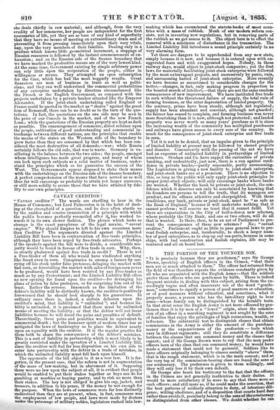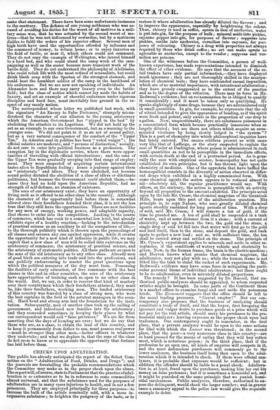THE PORTION OF THE YOUNGER SON.
"Iv is precisely because they are gentlemen," says Sir George Brown, speaking of English officers in the Crimea, " that their men are so much attached to them." The officer last returned from the field of war therefore repeats the evidence constantly given by all who are acquainted with the English Army—that the soldiers prefer those officers who are gentlemen by birth. There is indeed frequent mistake in dealing with this subject, arising from the ex- ceedingly vague and often inaccurate use of the word "gentle- man," sometimes to signify a person of good manners or education, or of good manners without education, and sometimes, what it properly means, a person who has the hereditary right to bear arms—whose family can be distinguished by the herald's tests. In that strict sense the English Army is not more officered by gen- tlemen than it is by men of a "lower" origin, since the commis- sion of an officer in a marching regiment is not sought by the sons of families that enjoy the privileges of high connexions' wealth, or influence. The substantial test to distinguish classes that obtain commissions in the Army is either the amount of the purchase. money or the expensiveness of the profession — tests which vary in different regiments; still they do constitute a difference between the classes that can command money and the classes that cannot ; and if Sir George Brown were to say that the men prefer officers born of the class that can command money, he would have made a statement that could not be gainsaid. Soldiers like to have officers originally belonging to classes socially " above" them, that is the rough statement, which is in the main correct ; and at the very top of the commission-bearing class are found the sons of our aristocracy. The preference is given to them willingly, and they will only lose it by their own default. Sir George also bears his testimony to the fact that the officers in the Crimea are not generally inattentive to their duties. It would be more satisfactory if be were to say that there were no such officers; and still more so, if he could make the assertion, that the best patterns of soldierly attention to duty, of laborious dili- gence, willing obedience, and of a disposition that courts bard fare rather than avoids it, peculiarly belong to the sons of the aristocracy as distinguished from other classes. We doubt whether he can make that statement. There have been some unfortunate instances to the contrary. The defence of one young nobleman who was ac- cused of avoiding his duties for the worst of all motives in a mili- tary sense was, that he was actuated by the second worst of mo- tives—that he was not influenced by cowardice, but by a mutinous dislike to fulfil the orders of his superior officer. Several men of high birth have used the opportunities afforded by influence and the oommand of money, to return home ; or to enjoy luxuries on the field of battle, or near it, which others could not command. They do not copy the example of Wellington, who inured himself to a hard bed, and who could stand the camp work of the cam- paigning as well as the easier because more transient work of the battle-field. They do not understand the philosophy of Alcibiades, who could relish life with the most refined of sensualists, but could drink black soup with the Spartan of the strongest stomach, and could beat the humblest soldier of the camp in the hardihood of his endurance. But we are now not speaking of individuals. An Alexander here and there may earry luxury even to the battle- field ; but the class of nobles which cannot lay aside the habits of luxury, and set an example of cheerful endurance under rigorous discipline and hard fare, must inevitably lose ground in the re- spect of any manly nation. The correspondent whose letter we published last week, with the signature "An Enemy to False Pretences," strangely misun- derstood the character of our allusion to the young aristocracy which the American Government has "nipped in the bud" by abolishing the attaches to its Legations. We did not hold up the act as an example to our own Government, but as a warning to the younger sons. We did not point to it as an act of sound policy, but as a very natural consequence of the conduct of the "Upper Ten." In America zeal in polities has been "voted vulgar"; the official salaries are moderate, and "persons of distinction," socially, do not care to enter into political business as a profession. The exception lay in the diplomatic service, where there were oppor- tunities of travelling with official introductions ; and the sons of the Upper Ten were gradually creeping into that range of employ- ment. They were suspected of acquiring certain international tastes alien to Republican feeling ; hence a jealousy against them as " aristocrats" and idlers. They were abolished, not because sound policy dictated the abolition of a class of idlers or dilettante politicians, but because the Government could abolish them,—he- cause they had no hold upon the American Republic, had no strength of self-defence, no stamina of existence.
The sons of our aristocracy exist; they have an opportunity of living such as is offered to no other class in the country. Although the character of the opportunity laid before them is somewhat altered since their forefathers founded their class, it is not the less true that they still have the opportunities. There are new facilities for any men of energy, working power, and adaptable capacity, that choose to enter into the competition. Looking to the course of commerce, which has sunk to a somewhat low level, but already exhibits signs of a healthy reaction,—looking to the introduction of practical science as an auxiliary to all the occupations of life,— to the thorough publicity which is thrown upon the proceedings of all classes and secures any one against oppression, while it creates the opportunity for a new kind of influence in public life, we may expect that a new class of men will be called into existence as the aristocracy of commerce, the aristocracy of practical science, and the aristocracy of systematic politics. All these paths are as open to the sons of the old aristocracy as to any other class. Already men of good birth are entering into trade and into the professions, and are publicly endeavouring to master the great questions upon which the political measures of the day must turn. Possessing the facilities of early education, of free commune with the best classes in this and in other countries, the sons of the aristocracy have opportunities of training such as open to no other class in the world. But, we say, in order to recover that kind of mastery over their countrymen which their forefathers attained, they must be, like their forefathers, working men. The landed aristocracy of this country was founded by a class of strong men, who were the best captains in the field or the astutest managers in the coun- cil. Hard head and strong 'arm laid the foundation for the insti- tution. Subsequently, men of another class took up the calling of government, and introduced new families into the aristocracy ; and they succeeded sometimes in keeping their places by what our correspondent would call "false pretences." We are far from asserting that the days of humbug are over ; but we do say that those who are, as a class, to obtain the lead of this country, and to keep it permanently from father to son, must possess real power —must be stronger than other men,—better officers in whatever they undertake ; and what we deplore is, that the sops of the class do not seem to know or to appreciate the opportunity that fortune has laid before them.



























 Previous page
Previous page